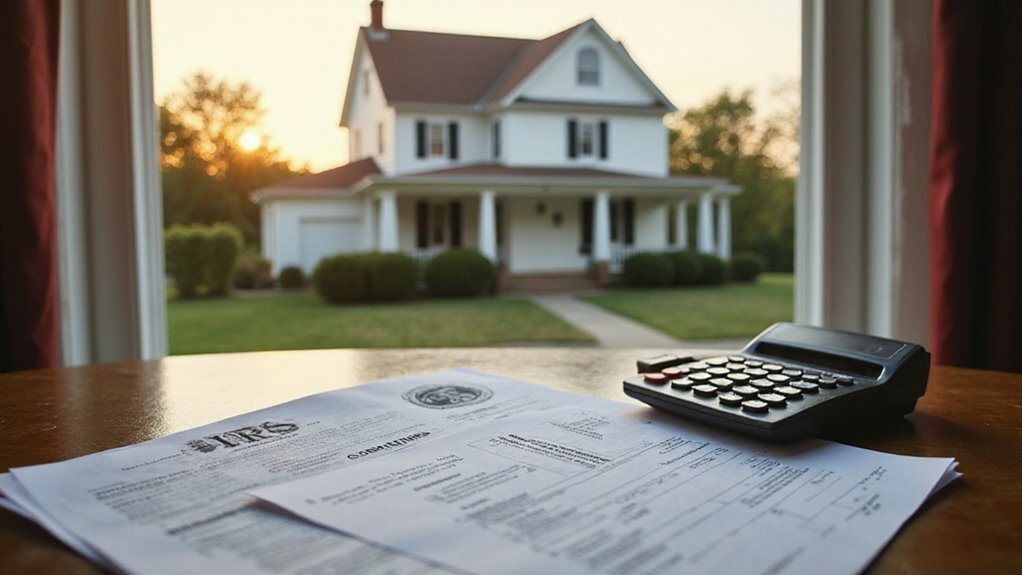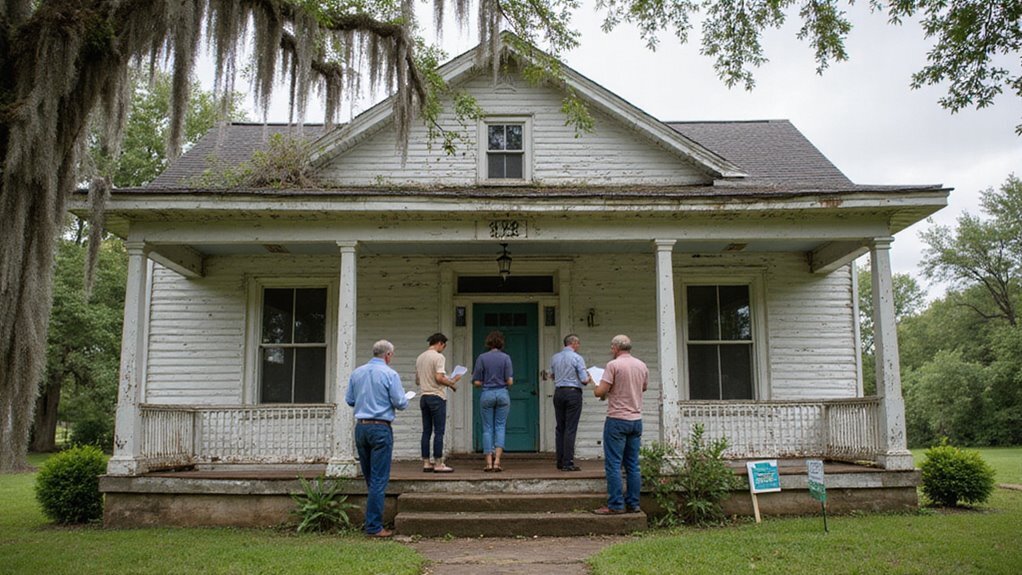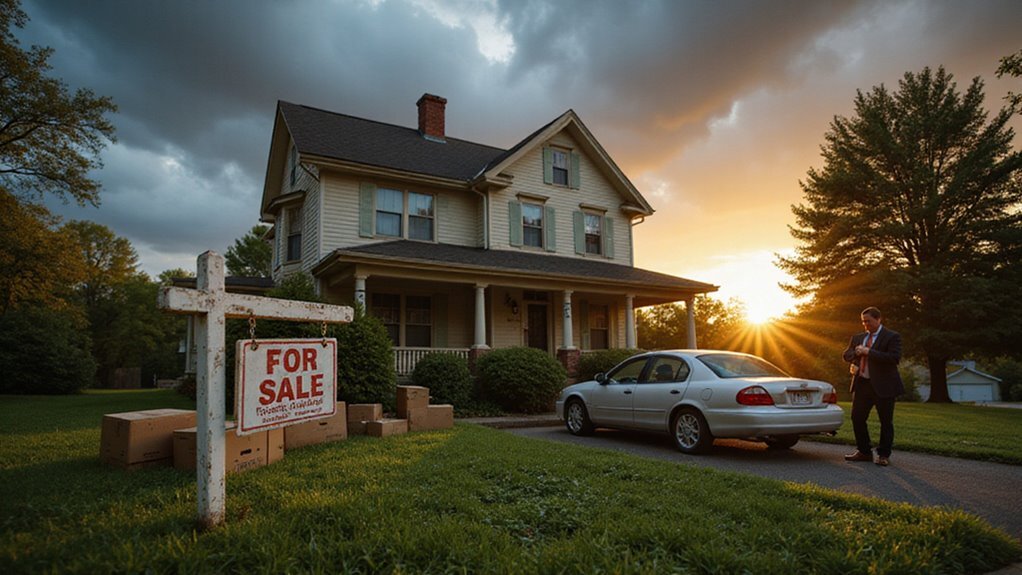Need to Sell an Inherited House Fast in Kentucky?
Inheriting a house often brings unexpected complexity alongside grief and family dynamics. Managing probate, taxes, repairs, and potential heir disputes creates overwhelming stress during emotional times. Delays in selling mean mounting costs, property deterioration, and strained relationships among family members. Following a clear process helps you sell quickly while minimizing taxes and complications.
When you inherit a house in Kentucky, you must navigate probate requirements, Kentucky inheritance tax, and capital gains implications. Selling options include traditional listings, FSBO sales, or auctions, each with distinct advantages. Multiple heirs require written agreements to prevent disputes and ensure smooth transactions.
In this guide I will explore everything related to selling an inherited house in Kentucky.
Key Takeaways
- Determine if the property requires probate or can transfer directly via joint tenancy or Transfer-on-Death Deed.
- Clear any liens and ensure a clear title before listing or selling the inherited house.
- Understand Kentucky inheritance tax and federal capital gains tax implications for heirs.
- Choose a sales method: traditional listing, FSBO, cash buyer, or auction, based on timeline and condition.
- Collaborate with estate attorneys and professionals to comply with legal requirements and facilitate a smooth sale.
What Happens When You Inherit a House?

You must first determine if the property enters probate or transfers directly to you. Properties solely in the deceased’s name typically require probate court proceedings. The court validates the will, appraises the property, and handles outstanding debts.
However, some properties bypass this process entirely. Joint tenancy arrangements and Transfer-on-Death Deeds allow direct ownership transfer without court involvement.
Kentucky inheritance tax may apply based on your relationship to the deceased. Understanding the transfer method helps you prepare for taxes and decide your next steps with the property.
What Are Your Options for an Inherited Property?
Once you’ve inherited a house in Kentucky, you have several options. You can keep it as your residence, rent it out to generate income, or sell the property outright.
Each choice depends on your goals, financial situation, and how quickly you want the process to move forward.
Keep the Property as a Residence
You can keep the inherited property and live in it yourself. This works well if you need a primary home or want a vacation retreat. First, transfer the deed into your name to establish legal ownership. Update the title if the property was held in joint tenancy or through a transfer-on-death deed.
Next, budget for ongoing costs like taxes, insurance, and repairs. Regular maintenance protects your investment. Simple upkeep prevents costly problems and preserves the home’s value over time.
Convert to a Rental Property
You can turn your inherited home into a rental to earn monthly income. This choice lets you keep the property while building long-term wealth.
Research Kentucky landlord laws before accepting tenants. You must maintain the property and handle repairs quickly. Create a strong lease agreement to protect your investment. Quality upkeep attracts reliable renters and ensures steady cash flow. This strategy works well if you want passive income without selling.
Sell the Inherited House
You can sell an inherited house in Kentucky through multiple methods. List the property with a licensed real estate agent after completing a title search. This ensures clear ownership before marketing begins.
Alternatively, you can pursue a For Sale By Owner approach for more control. Cash buyers and real estate investors often close faster with minimal contingencies. Properties still in probate require court approval before any sale proceeds. Clear all existing mortgages and liens before transferring ownership to new buyers.

“Brian with Ky Sell Now couldn’t have been any better to deal with. The offer was reasonable, they did what they said they would do, and did it when they said they would do it. Terms were good and they were flexible meeting our terms and needs.“
David Weinberg
What Legal Issues Should You Address First?

Start by understanding if probate is necessary, which depends on how the property is titled.
Next, ensure you have a clear title, whether through probate, joint tenancy, or a Transfer-on-Death deed, and address any outstanding mortgages.
Finally, review the tax implications for heirs to avoid surprises and confirm all legal requirements are met before listing the property.
Probate Process Explained
Yes, probate is required in Kentucky when the deceased owned the house solely in their name. The court must legally transfer ownership to heirs through this process.
As executor, you must file the will and death certificate with the county court. You’re responsible for notifying all heirs and settling estate debts. The court then authorizes the property transfer.
This legal process protects everyone involved. It ensures debts are paid and rightful heirs receive clear title to sell the property.
Title Transfer Requirements
You must obtain a clear title before selling your inherited Kentucky house. This protects both you and the buyer from future legal problems.
The title transfer process depends on how the property was owned. Joint tenancy properties transfer automatically with a death certificate and new deed.
Probate cases require a court order for the transfer. Make sure to pay off all liens and mortgages first. Record the updated deed with your county clerk to complete the process and enable a smooth sale.
Outstanding Mortgage Considerations
Yes, you must address any outstanding mortgage before selling. The lender holds a legal claim on the property until the debt is paid in full.
Start by confirming the current mortgage balance with the lender. Request an official payoff statement that shows the exact amount needed to clear the debt. This statement remains valid for a specific period, typically 30 days.
The mortgage must be fully satisfied before transferring ownership to a buyer. Most closings handle this automatically, with proceeds going directly to the lender. A clear title protects all parties and prevents future legal complications.
Tax Implications for Heirs
Heirs pay capital gains tax only on property appreciation after inheritance, not on the original value. This federal step-up basis rule protects you from decades of prior gains. Kentucky charges inheritance tax based on your relationship to the deceased. Closer relatives typically pay less.
Additionally, the inheritance type determines your next steps. Sole ownership requires Form 92A205 filing. Joint tenancy and transfer-on-death arrangements skip probate entirely, simplifying the transfer process significantly.
How to Handle Inherited Property with Multiple Heirs?

When multiple heirs share an inherited property, clear communication is key to avoiding conflicts. You can consider buyouts or sale agreements to split proceeds or pursue a legal partition if you can’t agree.
Each option requires understanding Kentucky law to ensure a smooth process and fair division.
Communication Strategies for Co-heirs
Start with an early family meeting to align expectations among all heirs. Document every agreement in writing to create a clear record. This prevents future disputes about who said what. Each beneficiary deserves respect and transparency throughout the process.
Consider hiring a neutral mediator when tensions run high. Professional guidance helps resolve conflicts before they escalate. You may need to explore buyout options or legal partition actions if heirs can’t agree on keeping the property together.
Buyout Options Between Heirs
One heir buys out the others’ shares of the property. This keeps ownership simple and avoids court battles. Each heir receives fair compensation for their portion of the home.
As a result, the property stays in the family. You can negotiate a price directly or hire an appraiser to determine market value. This method costs less than legal partition actions. Most importantly, it works well when heirs cooperate and want a quick resolution.
Legal Partition Process
A partition lawsuit forces the sale or division of inherited property when heirs disagree. This legal action resolves ownership disputes through court intervention.
You must file a partition petition in your local court. The court reviews your case and determines the best solution. Judges typically order either a physical division of the property or a forced sale. All heirs receive notice and can respond to the petition. The court’s final decision is binding on everyone involved. This process protects your rights and ensures fair treatment.
Selling and Dividing Proceeds
You must agree on a sale strategy before listing the property. Consider hiring a real estate agent, selling independently, or accepting a cash offer. The title must be clear and marketable for any sale to proceed.
After the sale closes, proceeds are split according to the will or Kentucky intestacy law. Each heir receives their designated share based on these legal documents.
This approach prevents disputes and protects everyone’s interests. Clear communication throughout the process ensures a fair settlement and lets all parties move forward confidently.

“Brian was so easy to work with. They were quick and efficient. After several months of working with another buyer without closing the deal, we are thankful to have found him. We were able to get a deal done and finalized in just a matter of weeks! I would recommend Kentucky Sell Now to anyone.”
What Tax Implications Come with Selling Inherited Houses?
When you sell an inherited house, understanding the tax implications is crucial. You’ll need to know about capital gains taxes, how the step-up basis can save you money, and any estate or inheritance taxes that might apply. Being clear on these points helps you avoid surprises and plan your sale effectively.
Capital Gains Tax Basics
Yes, you’ll likely owe capital gains tax when you sell an inherited house. However, you only pay tax on profits made after you inherited it.
The IRS gives you a major tax break through stepped-up basis. Your basis equals the home’s fair market value on the date of death. This means you won’t pay tax on appreciation that occurred during the original owner’s lifetime.
Calculate your taxable gain by subtracting your basis from the selling price. Document all improvements you make after inheriting the property. These costs increase your basis and lower your tax bill.
Step-up Basis Benefit
The step-up basis resets your inherited house’s value to its worth on the date of death. This tax rule can save you thousands of dollars. You won’t pay capital gains tax on appreciation that happened before you inherited the property.
Here’s how it works. Your tax basis becomes the fair market value at inheritance, not the original purchase price.
For example, your parent bought a house for $100,000 and it’s worth $300,000 when inherited. You only pay taxes on gains above $300,000 if you sell later.
Estate Tax Considerations
Estate taxes may apply even with a step-up basis. You need to settle all estate debts before distributing assets. Federal estate tax applies only if the estate exceeds $13.6 million. Kentucky has no state estate tax. However, inheritance tax varies by your relationship to the deceased. Close relatives typically pay lower rates.
Addressing these obligations early prevents delays when selling the inherited home. Understanding these requirements protects your interests and ensures a smoother transaction.
Tax Exclusions and Exemptions
Federal law provides a step-up in basis when you inherit property. This resets the home’s value to its fair market worth on the date of death. Your capital gains taxes drop significantly as a result. Kentucky offers property tax exemptions based on your relationship to the deceased.
You must verify all assessments are current during estate settlement. These benefits reduce your overall tax burden and protect more of your proceeds from the sale.
How to Prepare an Inherited House for Sale?
To get your inherited house ready for sale, start with a thorough property evaluation and inspection to identify issues. Clear out personal belongings and make necessary repairs or improvements to boost curb appeal. Decide whether to stage the home or sell as-is to attract buyers and speed up the sale process.
Property Evaluation and Inspection
Start with a professional home inspection to understand what you’re selling. An appraiser will determine your inherited house’s current market value. This step prevents pricing mistakes and costly surprises later.
The inspection reveals critical issues you must address. Structural water damage, code violations, mold, and pest infestations can derail your sale. Once you know the problems, you can decide whether to repair them or sell as-is. Both options work depending on your timeline and budget.
Dealing with Personal Belongings
Start by sorting items into three categories: keep, donate, or discard. This method speeds up the clearing process. You might find valuable pieces worth selling through estate sales or liquidation services.
Next, remove all personal items to create a neutral space. Buyers need to envision their own belongings in the home. A clutter-free property shows better and typically sells faster. This step also helps you emotionally detach from the property while honoring memories appropriately.
Necessary Repairs and Improvements
Yes, you should complete essential repairs before listing. Focus on safety issues first, such as fixing leaks, broken windows, and faulty electrical systems. These problems can scare away buyers or reduce your offers significantly.
Beyond repairs, remove all clutter and personal items from the property. A clean, empty space helps buyers envision their future home. Paint walls in neutral colors like beige or gray to appeal to more people. Additionally, verify the property meets local building codes to avoid legal complications during the sale.
Staging vs. Selling As-Is
You have two options: stage the home or sell it as-is.
- Staging makes the property look move-in ready and can increase its value. However, it costs money upfront and takes extra time.
- Selling as-is is faster and requires no repairs or investment.
The best choice depends on the property’s condition and your available budget. Consider what’ll attract buyers while fitting your timeline and financial situation.
What Are the Best Ways to Sell an Inherited House?
You have several options to sell an inherited house in Kentucky, each with its own benefits. You can list it traditionally with an agent, try a For Sale By Owner approach, work with cash buyers, or consider auctioning it off. Choosing the right method depends on your timeline, property condition, and financial goals.

Traditional Real Estate Listing
A traditional real estate listing lets you sell through an agent. This method works well when you want professional guidance and maximum sale price. The process takes longer but often yields better returns.
Start by finding an agent who knows inherited properties. They understand probate requirements and tax implications. Next, get a professional appraisal to set the right price. You may need to make repairs or stage the home before listing it.
For Sale By Owner Approach
A For Sale By Owner (FSBO) approach lets you sell an inherited house directly without an agent. You avoid paying the typical 5-6% commission fees and control the entire sales process. This works best when the property has a clear title and you understand local market values.
However, you must handle all negotiations and paperwork yourself. You’re responsible for marketing, showings, and meeting legal requirements. Set a competitive price based on comparable homes in your area to attract serious buyers quickly.
Working with Cash Home Buyers
Cash home buyers purchase properties quickly and without traditional financing delays. They buy houses in their current condition, which means you skip costly repairs and lengthy preparations.
Most cash sales close within 7 to 14 days, far faster than conventional transactions. Before selling, verify all property liens are resolved or properly disclosed. The buyer will conduct a brief inspection to assess the home’s value.
Clear title transfer is essential, particularly when probate or transfer-on-death deeds are involved. This approach delivers immediate funds while eliminating the stress of traditional home selling processes.
Auction Options
Yes, auctions work well for inherited properties. They provide a fast, transparent sale that benefits all heirs equally. The process attracts serious buyers who pay cash and close quickly.
Most estate auctions complete within 30-60 days, which speeds up probate settlement. You must obtain a clear title and professional appraisal first. Both live and online formats are available depending on your needs.
This method eliminates lengthy negotiations and ensures fair market value. All heirs receive their share promptly, avoiding family disputes.
Ready to Sell Your Inherited House Fast? Contact Kentucky Sell Now Today!
Selling an inherited house in Kentucky requires understanding legal requirements, tax implications, and preparation steps. If you want to avoid lengthy repairs and complicated processes, we offer a straightforward solution. At Kentucky Sell Now, we buy houses in Louisville, KY and other cities across Kentucky State. We simplify the entire selling experience for inherited property owners.
When you work with us, you skip traditional listing hassles and closing delays. We purchase homes in as-is condition, regardless of repairs needed or property age. If you need to sell quickly, we provide fair cash offers within days. We handle all paperwork and guide you through each step of the transaction.
Your inherited property represents both memories and new opportunities for your future. If you’re ready to move forward without stress, we’re here to help. Contact Kentucky Sell Now today and let us turn your inherited house into a fresh start. We make selling simple so you can confidently begin your next chapter.
Do I need to pay taxes when selling an inherited house in Kentucky?
You may owe capital gains tax based on the property’s value at inheritance, not the original purchase price.
Can I sell an inherited house if not all heirs agree?
All heirs must consent. If not, a court-ordered partition sale may be required to settle disagreements.
How do you determine the price to offer on my home?
Great question, and we’re an open book: Our process is very straightforward. We look at the location of the property, what repairs are needed, the current condition of the property, and the value of comparable homes sold in the area recently. As you know, home values have taken a huge hit in the last 5 years and most areas still haven’t seen prices come back up. We take many pieces of information into consideration… and come up with a fair price that works for us and works for you too.
How long does it take to sell an inherited house in Kentucky?
It varies. A traditional sale can take months, while a cash buyer can close in as little as 7 days.
Do I need to go through probate before selling?
Yes, if the property wasn’t in a trust. Probate legally transfers ownership before selling.
Can I sell an inherited house as-is?
Yes, you can sell it as-is to avoid repairs. Many Kentucky cash buyers purchase inherited homes in any condition.
Sell Your House Fast in Louisville, Kentucky 💰
We buy houses in Louisville, Kentucky As-Is! No Hidden Fees or Real Estate Commissions. Sell Your House in Louisville, Kentucky And Close On The Date Of Your Choice. Simply Fill Out The Form, or call (502) 610-0070 today!

